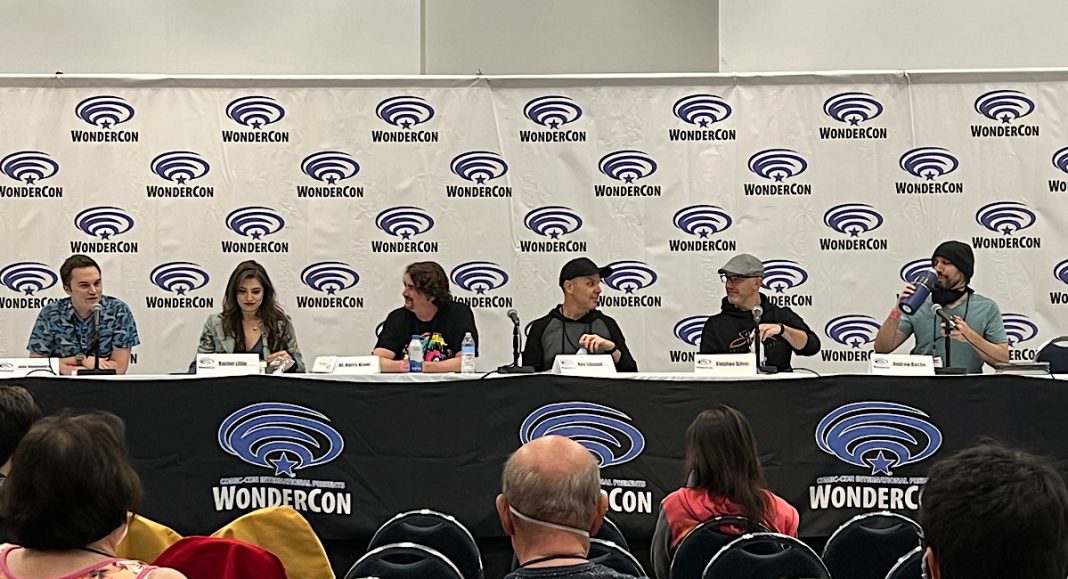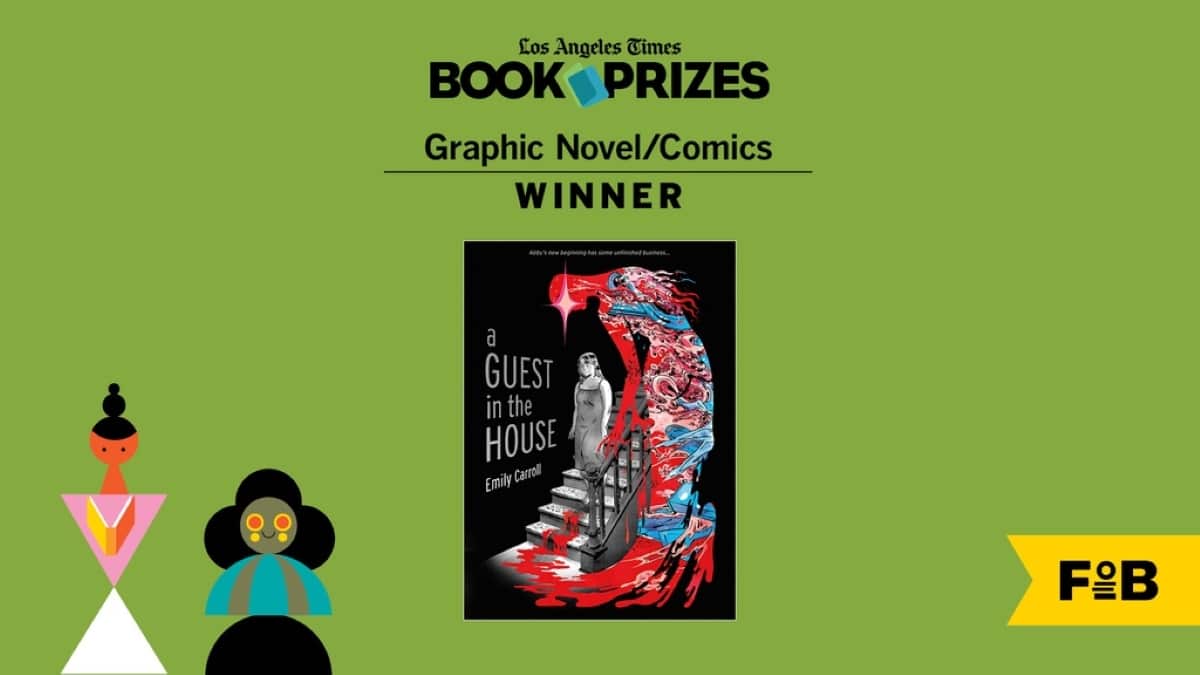Adapt, execute, and sell yourself. That is the advice the five creatives on “The Business of Independent Art and Comics”– Andrew Racho (Convenience Store Diet), Stephen Silver (Kim Possible and Danny Phantom), Neo Edmund (Red Riding Alpha Huntress Chronicles), Harry Kloor (Quantum Quest) and Rachel Litfin (The Chronicles of Noble High) emphasized while talking about the career detours forced upon them when the Great Pandemic of 2020 threw many independent creators under the proverbial bus. And if at first you don’t succeed, try and try again.
Adapt
When the Great Pandemic first hit at the end of 2019, many of these artists were in the middle of kicking off new projects or launching promotional tours of just completed projects. The pandemic brought a swift end to some of this work. Racho, who was employed as an actor at the time, suddenly found himself out of a job. While advising a friend on the ins and outs of book publishing, Racho realized everything his friend needed was already available for the offering on the Internet and through social media—the tips and tricks behind the trade as well as artists-for-hire. And Racho the actor became Racho the writer.
Prior to the pandemic, Silver worked in and taught character design in animation. When work came to a standstill, Silver channeled his energies into creating an online drawing academy that included courses in character design. He emphasized the importance of evolving a career by tapping into one’s knowledge and creative abilities and casting aside the doubt and fear inspired by social media concerns.
“You want to learn how to self-publish, you can run out and self-publish. The only thing that’s stopping you is yourself and your own insecurity. Nike said it best. Just do it. And don’t ever be afraid of failure. I’ve noticed throughout my years of teaching, that’s the big thing that stops people from ever really achieving anything because of what someone can say or what someone else can think of in the social media age. We’re so concerned about how many likes we have in everything. Oh, I didn’t get enough likes therefore I’m not going to try it again. And you end up giving up. Don’t give up. Just do it and that’s it. See where it takes you.”
Edmund ran across a different problem with the pandemic. Supply chain and paper scarcity issues complicated the printing and distribution process, and so Edmund turned to Kindle books as a way to bypass the supply chain problems. Kloor channeled his passions—science and technology—into a humanoid robotics company while revamping his movie Quantum Quest. Litfin was about to embark on a book tour to promote her second book when the pandemic put a stop to the tours and lucrative convention appearances. To redefine herself, Litfin pivoted to Kindle books and doing homeschool talks through Zoom to inspire young minds in pursuit of writing ambitions. She also sought out social media sources to promote her work.
“It was a challenge to redefine what it meant to be successful in my industry. On social media, Bookstagram has exploded so if you’re in any kind of the book world, there’s a huge social media push on Bookstagram right now where people make so much content about their favorite books, and there are memes and people cosplaying their characters. It’s an incredible movement, and I love seeing that explode.”
Self-publish and self-promote
The days of finding major publishers to push independent work is a byproduct of the past. The common thread running through the discussion was self-publishing and self-promoting. Edmund talked about the narrow attention span major publishers provide to artists and how the burden of promotion falls to the artist.
“You get this tiny window. Their attention on it was about six seconds long. I have books coming out and I was able to see a launch [in a comic convention]. is there anything there and are we doing anything? You don’t know like [if] you’re gonna be there or signing in a main booth. And I decided to myself that my co-workers downstairs in the hall, upstairs in artists alley are selling more books and running out of books. I had to go buy books from there because I’m running out of books upstairs. That’s their whole game.”
Even network shows get short shrift when it comes to promotion. Racho’s sentiments on his experience with Comedy Central’s Robot Chicken at a comic convention echoed Edmund’s experiences with the big publishing houses.
“This is a huge anime show on a very well-known network that is being promoted at zero here. This is not good. I don’t even think I see a bright future. We had dozens of creators on that show, and nobody was out there promoting it. You would expect they got to show and get everybody out there doing all these events and getting awareness. Most of the time, even at the highest levels people aren’t going to care. You have to be willing to do that even in television. And especially for books. there are billions of books published each year. It’s unimaginable but the only person who’s going to do any of that stuff to get attention is you until somebody wants to ride your coattails. Do your own press, get out to conventions. Get out to do whatever your distribution platform…Tik Tok or Instagram or Patreon or Twitch streamer.”
Silver concurred, but with a little more bite.
“I just want to say that’s the biggest misconception is that they can take care of you, but they don’t always have to self-promote. And this is the whole thing that comes down to artists…a lot of people will make promises to you about give me this, give me that opportunity exposure. You’re in charge of your exposure and you’ll be disappointed every single time you’re going to get ghosted.”
Social media is great, but know its limitations
According to Silver, social media is twenty percent business and eighty percent show in the business of independent art and comics. Focus on the message. Consistent messaging is vital to selling or promoting a creative service.
“If your goal is to make it a business, it’s going to be a business and you have to follow the things that work in order to sell something to somebody else doing the thing that you love to do. You want to get that into the hands of other people and make a profit at it,” said Silver. “You want to make stuff because you like making stuff. Not everything has to earn money or power or anything. You don’t need the thing that you create to to turn into something else. You can just create it and enjoy it and let other people enjoy it. Or you can turn a new business.”
In addition to consistency, treat social media accounts like a resume for a job interview.
“Stay consistent with what it is that you’re putting out there because other artists are finding jobs now from recruiters, who would just go through your social media, so you don’t want someone who’s scrolling through it to see what you had for dinner,” said Silver. “We’re trying to create a wall of your social media posts that’s consistent so people get to know your brand and then they start to see who you really are and your voice because that plays a huge role in you finding that work. Choose wisely. It’s a business, so make a business progression.”
Social media platforms have grown hip to self-promotion, and now they want a piece of the action.
“It’s weird, like 10 years ago, I like something on Facebook, or Instagram, or whatever,” said Racho. “Now it’s like their algorithms are designed to know that you’re trying to sell something and every little post like on Facebook, if you put up a post on my proper page, you immediately get a message like promote this post 50 bucks or whatever. If you don’t do it, you get nothing. You get zero engagement. It just somehow knows you’re trying to sell something. You try to get crafty about it.”
And according to Litfin, it’s okay to seek help where help is needed. The sophistication of social media platforms prompted Liftin to hire a social media manager to navigate the cumbersome array of algorithms so she could concentrate on the task of writing.
To Literary agent or not to literary agent? That is the question!
An audience member asked the panelists whether it was helpful to hire a literary agent. The experiences of the panelists were a mixed bag. They likened agents to a gatekeeper that may or may not work to a creator’s favor.
“I’ve had lots of agents that never got out every single job,” said Kloor.
“Agents just don’t represent you,” said Silver. “When you do it yourself, you’re in control once again, and you get lost in the mix sometimes with agents.”
“I said earlier that there’s a lot less gatekeepers in the world, and they’re kind of upset because we reinvented their game,” said Litfin. “Sorry, not sorry that I met your boss at a con and we did it all with drinks in the lobby.”
Execute: do the work
The basic task of getting work in the business of independent art and comics boils down to doing the work. According to Silver:
“It comes down to two things. Number one is just show up like you guys are here. The next one is the Boy Scout Motto, which is be prepared. That is just having a website they want to show, self-publishing the old book…business cards are tapping their pockets. I just showed up to an art meeting one time and there was an animator that works on the show for Freakazoid back in the day and my portfolio by my side. I showed it to him, and he said ‘Hey, keep in touch.’ Now you can just say ‘Oh, thanks.’ But I kept in touch and I followed through. That’s another thing. Follow through and meet people and it led to me showing up at Warner Brothers back in 97 with my portfolio and then giving me a test and breaking into the industry. That’s how it all started…to show up.”
The panelists emphasized finding a path, executing, and doing the work without worrying about its success or failure and whether people like the work or don’t like the work. Perhaps Racho summed it up best when he said:
“You gotta just get in the game and outlast everyone else.”
Miss any of our previous WonderCon 2022 coverage? Click here!




